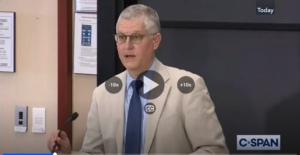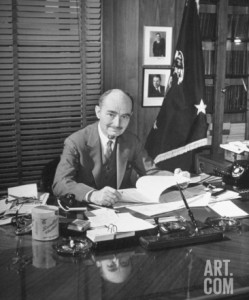Thursday, June 14, 2018, will mark the 75th anniversary of the decision by the Supreme Court of the United States, embodied in Justice Robert H. Jackson’s opinion for the Court, in West Virginia State Board of Education v. Barnette.
The Barnette decision, rendered amid the commendable patriotism that characterized the United States home front during that dark middle period of World War II, invalidated a West Virginia board of education resolution requiring all public school teachers and students to participate in a salute to the American flag and a recitation of the Pledge of Allegiance.
The case was brought on behalf of students who were Jehovah’s Witnesses. In deference to their belief that the Bible forbade them to bow down to graven images, they refused to salute the flag. For that refusal, they were expelled from school. Expulsion had the effect of making the children unlawfully absent, which subjected them to delinquency proceedings and their parents to criminal prosecution.
In Barnette, the Supreme Court held, by a vote of 6-3, that the flag salute and pledge requirements violated the children’s First Amendment rights, which exist to strengthen “individual freedom of mind in preference to officially disciplined uniformity…”
A leading hero of the Barnette case, in addition to the children, their parents and their lawyer, was the Chief Justice of the United States, Harlan Fiske Stone. In June 1940, when Stone was an Associate Justice and U.S. involvement in the war in Europe was impending, he had dissented powerfully but alone from the Court’s decision to uphold Pennsylvania’s flag salute requirement. (At that time, Robert Jackson, who was U.S. Attorney General and a Supreme Court nominee, reported to President Roosevelt and the Cabinet on the anti-alien, anti-“fifth column” hysteria that was sweeping the country. Jackson criticized the Supreme Court for joining in that hysteria by ruling against Jehovah’s Witnesses in the Pennsylvania case.)
By June 1943, Stone had been appointed Chief Justice; new Associate Justices, including Jackson, had joined the Court; and a majority of the Justices was prepared to revisit and rectify what they saw as the Court’s earlier mistake.
Chief Justice Stone assigned Justice Jackson, the junior justice, to write the Court’s opinion in Barnette. Although all of it bears reading (and regular rereading), some words to consider particularly closely are Jackson’s summary paragraphs:
The case is made difficult not because the principles of its decision are obscure but because the flag involved is our own. Nevertheless, we apply the limitations of the Constitution with no fear that freedom to be intellectually and spiritually diverse or even contrary will disintegrate the social organization. To believe that patriotism will not flourish if patriotic ceremonies are voluntary and spontaneous instead of a compulsory routine is to make an unflattering estimate of the appeal of our institutions to free minds. We can have intellectual individualism and the rich cultural diversities that we owe to exceptional minds only at the price of occasional eccentricity and abnormal attitudes. When they are so harmless to others or to the State as those we deal with here, the price is not too great. But freedom to differ is not limited to things that do not matter much. That would be a mere shadow of freedom. The test of its substance is the right to differ as to things that touch the heart of the existing order.
If there is any fixed star in our constitutional constellation, it is that no official, high or petty, can prescribe what shall be orthodox in politics, nationalism, religion, or other matters of opinion or force citizens to confess by word or act their faith therein. If there are any circumstances which permit an exception, they do not now occur to us.
We think the action of the local authorities in compelling the flag salute and pledge transcends constitutional limitations on their power and invades the sphere of intellect and spirit which it is the purpose of the First Amendment to our Constitution to reserve from all official control.
In the views of many, Barnette is a high point in U.S. Supreme Court history and one of Justice Robert Jackson’s very finest judicial opinions.
It was, in the United States in 1943, just a coincidence that the Supreme Court decided Barnette on “Flag Day.” In history, that coincidence is an added dimension of the decision’s teaching power.
* * *
Some links—
- West Virginia State Board of Education v. Barnette, 319 U.S. 624 (1943)—click here;
- a 2006 roundtable discussion featuring sisters Gathie and Marie Barnett (whose surname got misspelled at some point in the litigation) and related commentary—click here;
- a 2012 Jackson List post, “Arguing Barnette”—click here; and
- a 2010 Jackson List post, “The Newest Barnette Sister”—click here.
—————–
This post was emailed to the Jackson List, a private but entirely non-selective email list that reaches many thousands of subscribers around the world. I write to it periodically about Justice Robert H. Jackson, the Supreme Court, Nuremberg and related topics. The Jackson List archive site is http://thejacksonlist.com/. To subscribe, email me at [email protected]. Thank you for your interest, and for spreading the word.



